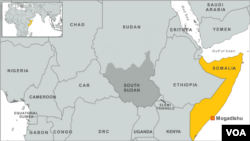Escalating food prices, poor rains and armed conflict could be the perfect storm for another famine to hit Somalia in the coming months. But a Nairobi-based NGO is teaching Somali’s and other Horn of Africa neighbors that history does not have to repeat itself.
“While it is not officially a famine condition right now, there are serious humanitarian concerns, particularly for those in southern Somalia who are victims of the conflict,” says Degan Ali, executive director of African Development Solutions – Adeso. Ali said still more communities are indirectly affected by the conflict through high food prices or or lack of access to food.
The development group empowers Africans caught in the cross-hairs of war, poverty and famine. One of the biggest challenges in the region is avoiding hunger, Ali says.
She said one way to ward of food insecurity is through Adeso's cash for work programs. The development organization’s goal is for Africans to take care of themselves without always relying on global aid. Adeso has pioneered this work in Africa and has operated cash transfers to vulnerable households in the horn of Africa for over 10 years.
“It’s because we believe that people have diverse needs like you and I,” said Ali. “They don’t have just a food need. They have also a water need, they have a shelter need, they have a health need. And cash transfers give them the options -- the flexibility to basically provide for themselves and their children beyond just the food aid that’s given.”
The most resilient community
Somali’s are preparing themselves for a looming famine, Ali said. “Actually, Somalis are the most resilient community. They’ve been in conflict and war conditions without effective government for almost 25 years. And in that time period, we’ve actually had a famine where 260,000 people have died.”
Remittances from families working in the region or abroad represent one of their most effective tools, she said. She estimates about $1.3 billion comes from remittances from relatives, “and these are Somalis really helping themselves.”
Even during the worst food crisis, international humanitarian aid did not reach the level of remittances. And while the international community continues to provide humanitarian assistance, more needs to be done on the local level.
Ali believes that working at the local level is the best way to improve the lives of people suffering the extreme circumstances of war and famine.




